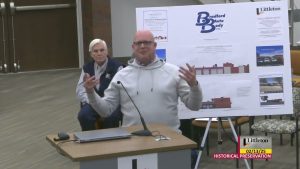Welcome to our comprehensive guide on how weather conditions in Colorado can impact roof replacement projects. As a homeowner or property owner in Colorado, you may have experienced the changing weather patterns and their effects on your roofs. The extreme temperature, hailstorms, heavy snowfall, and high winds that are commonly experienced in Colorado can have a significant impact on the longevity of your roof. That’s why it’s important to understand the challenges and considerations that may arise when planning a roof replacement project in Colorado.
In this section, we will explore the impact of weather conditions in Colorado on roof replacement projects. We will discuss the various challenges and considerations that arise due to the state’s climate variations. So, if you’re planning to replace your roof in Colorado, read on to learn about the importance of weather considerations and how to navigate weather-related challenges for a successful roof replacement project.
The Importance of Weather Considerations for Roof Replacement in Colorado
When planning a roof replacement project in Colorado, it is essential to take weather conditions into account. The state’s climate variations can have a significant impact on the project’s success, and failure to consider weather factors can result in potential challenges and risks.
Some of the weather-related challenges that can arise during a roof replacement project include unexpected rain or snow, high winds, and extreme temperatures. These can affect the timing of the project, the materials used, and the safety of the workers on site.
Timing is crucial when it comes to roof replacement in Colorado, as certain seasons can bring specific weather conditions that affect the project’s outcome. For example, snow and ice buildup during the winter can delay the project, while intense hailstorms during the summer can cause damage to the roof and surrounding areas.
Working with a roofing contractor who is well-versed in Colorado’s weather-related challenges can help mitigate these potential issues. Experienced contractors can advise on the best materials to use, work within a project schedule that accounts for weather interruptions, and prioritize safety measures for workers on site.
Ultimately, taking weather considerations into account when planning a roof replacement in Colorado can help ensure the project’s success and prevent potential problems down the line.
Understanding Colorado’s Climate and Weather Patterns
Colorado’s climate is characterized as semi-arid, with a wide range of temperature variations and weather conditions. The state’s high elevation, ranging from 3,315 feet to over 14,000 feet, adds to the complexity of its climate patterns.
The eastern part of Colorado experiences a more continental climate, with hot summers and cold winters. The western portion of the state is more mountainous, with milder temperatures throughout the year.
Colorado is also known for its extreme weather conditions, including heavy snowfall, hailstorms, and high winds. Summers are known for thunderstorms, and the state has experienced severe flash floods in the past.
| Month | Average High | Average Low | Precipitation (inches) |
|---|---|---|---|
| January | 43 °F | 15 °F | 0.6 |
| February | 44 °F | 17 °F | 0.7 |
| March | 53 °F | 23 °F | 1.3 |
| April | 62 °F | 30 °F | 1.8 |
| May | 72 °F | 39 °F | 2.2 |
| June | 82 °F | 47 °F | 1.9 |
| July | 89 °F | 53 °F | 1.8 |
| August | 86 °F | 51 °F | 1.9 |
| September | 77 °F | 42 °F | 1.4 |
| October | 65 °F | 32 °F | 1.2 |
| November | 50 °F | 21 °F | 0.8 |
| December | 42 °F | 14 °F | 0.6 |
As shown in the table, the temperature and precipitation vary significantly throughout the year. This means that choosing the right time for roof replacement in Colorado is critical to ensure optimal results and minimize weather-related challenges.
Seasonal Considerations for Roof Replacement in Colorado
Colorado’s climate varies significantly throughout the year, with each season bringing its unique weather conditions. These weather changes impact the construction industry in many ways, especially in roofing projects. Let’s take a closer look at the seasonal considerations for roof replacement in Colorado.
Spring
Spring in Colorado brings sunny days with occasional rain and thunderstorms. The unpredictable weather may cause delays in roofing projects, especially in case of heavy rainfall that can disrupt the project. Additionally, springtime is the busiest season for roof replacements, which may affect the availability of contractors and materials.
Summer
Summer in Colorado is relatively dry and warm, making it an excellent season for roof replacements. The warm weather ensures the materials will bond correctly, and the sunny days provide ample time for the project to complete. However, the higher demand during summer can drive up prices and reduce the availability of roofing contractors.
Fall
With the fall season comes cooler temperatures and more unpredictable weather patterns. There may be occasional wind and rainstorms, and the weather may become colder with early snows. The cold weather can cause the materials to become brittle, which can be challenging for contractors to handle. Additionally, the roofing season may be coming to an end, and contractors may be booked up through the end of the year.
Winter
Winter in Colorado is the most extreme weather season, with heavy snowfall, ice, and freezing temperatures. Roofing projects during winter present a significant challenge, as the snow and ice may cause delays. Moreover, the materials may not bond properly due to lower temperatures, which reduces the quality and longevity of a roof replacement. However, some contractors offer reduced prices during winter and can complete the project faster due to low demand.
Overall, the best time for a roof replacement project in Colorado is during the summer months. However, with careful consideration of the seasonal weather patterns, a roof replacement can be done successfully at any time of year. Choose your timing wisely and work with an experienced roofing contractor for optimal results.
Extreme Weather Events and Their Impact on Roof Replacement
Colorado is no stranger to extreme weather events, and these can have a significant impact on roof replacement projects. Here are some of the most common extreme weather events in Colorado and how they affect roof replacement:
Hailstorms
Hailstorms are a frequent occurrence in Colorado, especially during the summer months. These storms can cause significant damage to roofs, leading to leaks and structural issues. It’s important to choose roofing materials that can withstand hail impact and to have your roof inspected after a hailstorm to assess any damage.
Heavy Snowfall
Heavy snowfall in Colorado is common, and it can put a significant amount of weight on your roof. If your roof is not properly maintained or if it’s already damaged, heavy snow can cause it to collapse. Regular maintenance, such as snow removal, can help prevent this from happening.
High Winds
Colorado is prone to high winds, which can damage roofing materials and cause them to become loose or detached. This can lead to leaks and further damage during the next storm. It’s important to choose a roofing material that can withstand high winds and to have your roof inspected regularly to ensure that it’s secure.
Overall, extreme weather events in Colorado can have a significant impact on the success of a roof replacement project. It’s important to work with a roofing contractor who is knowledgeable about these events and can help you choose the right materials and maintenance strategies to protect your roof.
The Role of Roofing Materials in Colorado’s Weather Conditions
Choosing the right roofing materials is crucial when planning a roof replacement project in Colorado. The state’s varying weather conditions can take a toll on a roof, so it’s essential to select materials that can withstand these challenges. Below are some roofing materials that are best suited for Colorado’s climate:
| Material | Description |
|---|---|
| Asphalt shingles | One of the most popular roofing materials in the US, asphalt shingles provide excellent protection from harsh weather conditions, including hail and heavy snowfall. They are also affordable and easy to install. |
| Metal roofing | Metal roofs are highly durable and can withstand high winds, heavy rainfall, and hailstorms. They are also energy-efficient, making them an excellent choice for Colorado’s sunny climate. |
| Tile roofing | Tile roofs are known for their longevity and ability to withstand extreme weather conditions. They are also fire-resistant and provide excellent insulation, making them suitable for Colorado’s climate. |
When selecting roofing materials, it’s essential to consider their impact on the environment as well. Choosing eco-friendly options, such as solar tiles or recycled shingles, can help reduce your carbon footprint and save money in the long run.
Additional Considerations for Choosing Roofing Materials
Other factors to consider when choosing roofing materials include:
- The slope of your roof
- The style of your home
- The local building codes and regulations
- Your budget
Working with a reputable and experienced roofing contractor can help you navigate these considerations and select the right materials for your roof replacement project.
Finding Reliable Roofing Contractors for Colorado’s Weather
Choosing the right roofing contractor is crucial for the success of a roof replacement project in Colorado, especially considering the impact of weather-related challenges. To ensure that you have a reliable and experienced contractor, follow these tips:
- Look for local contractors who have been in business for several years and have extensive experience working in Colorado. Local contractors are familiar with the weather conditions, building codes, and regulations in the area.
- Check the contractor’s credentials, certifications, licenses, and insurance policies. A reliable contractor should possess all the necessary documentation.
- Read reviews and testimonials from previous customers. This can provide valuable insights into the contractor’s work quality, professionalism, and customer service.
- Ask for references from the contractor and personally contact them to inquire about their experience working with the contractor.
- Ask about the contractor’s process for handling weather-related challenges, such as delays due to rain or snow. A professional contractor should have contingency plans in place to minimize disruptions to the project schedule.
- Request a detailed written estimate from the contractor that includes all costs and timelines. Make sure to read and understand all the terms and conditions of the estimate before signing the contract.
- Communicate clearly with the contractor about your expectations, requirements, and concerns. A good contractor should be responsive, transparent, and open to feedback.
By following these tips, you can find a trustworthy and competent roofing contractor who can help you navigate Colorado’s weather-related challenges and ensure a successful roof replacement project.
Tips for Planning a Roof Replacement Project in Colorado
Planning a roof replacement project can be a daunting undertaking, especially in a state like Colorado where weather conditions can vary widely. However, with careful planning and consideration, you can ensure a successful project that protects your home for years to come. Here are some tips:
Consider the Weather
Before starting a roof replacement project, it’s essential to consider the weather conditions in Colorado. The state experiences a range of weather patterns, from heavy snowfall to hailstorms, high winds, and extreme temperatures.
To minimize project delays and disruptions, plan your roof replacement during the season with the most favorable weather conditions. This will help ensure that the project proceeds smoothly and that your home remains protected.
Budget Accordingly
Roof replacement can be a significant investment, so it’s crucial to budget accordingly. Before embarking on a project, request quotes from several contractors to get an accurate estimate of the cost.
Be sure to factor in costs related to weather considerations, such as additional materials or labor required for extreme weather events. It’s also essential to account for any potential project delays due to inclement weather.
Communicate with the Contractor
Effective communication with the roofing contractor is integral to a successful roof replacement project. Be sure to discuss weather-related concerns with the contractor, such as how they plan to handle inclement weather or how they will protect your home from potential damage.
It’s also essential to establish clear expectations for the project timeline and progress updates. Regular communication with the contractor will help ensure that the project runs smoothly and that you are satisfied with the end result.
Prepare for the Unexpected
Despite careful planning, unexpected weather events can still disrupt a roof replacement project. It’s crucial to have contingency plans in place to minimize damage and delays.
Be sure to discuss these plans with the contractor before starting the project. This can include strategies such as temporary roofing coverings to protect the home during a storm or rescheduling work during periods of inclement weather.
- Consider the weather when planning the project timeline and budget accordingly.
- Communicate regularly with the contractor and establish clear expectations for the project.
- Have contingency plans in place to minimize damage and delays due to unexpected weather events.
Maintenance and Care Tips for Roofs in Colorado
Roofs in Colorado are subject to intense weather conditions that can cause significant damage over time. To ensure the longevity and durability of your roof, it’s essential to take proper care and maintenance measures. Here are some tips to help you protect your roof from weather-related challenges:
1. Regular Inspections
Regular inspections of your roof can help you identify any issues before they become major problems. Schedule an annual inspection with a professional roofing contractor to ensure your roof is in good condition and identify any necessary repairs.
2. Keep Gutters Clean
Gutters play a crucial role in protecting your roof and home from water damage. Make sure to keep them clear of debris to prevent water from backing up and damaging your roof.
3. Trim Trees
Overhanging tree branches can cause damage to your roof, especially during high winds and heavy snowfall. Trim back any branches that are close to your roof to prevent them from causing damage.
4. Remove Snow Buildup
Excessive snow buildup on your roof can cause significant damage over time. Remove any snow buildup using a roof rake or hire a professional to do it for you.
5. Repair Damage Promptly
If you notice any damage to your roof, such as missing or damaged shingles, it’s essential to have them repaired promptly. Ignoring small issues can lead to more significant problems and costly repairs.
6. Use Suitable Roofing Materials
Using roofing materials that are suitable for Colorado’s weather conditions can go a long way in protecting your roof from damage. Consider using materials that are durable and can withstand extreme weather events.
By following these maintenance and care tips, you can help protect your roof from weather-related challenges and ensure its longevity in Colorado’s unique climate conditions.
Common FAQs About Weather and Roof Replacement in Colorado
Here are some frequently asked questions about the impact of weather on roof replacement in Colorado:
1. Is it possible to replace a roof during winter in Colorado?
Yes, it is possible to replace a roof during winter in Colorado, but it can be more challenging due to snow and ice. It’s important to work with a roofing contractor that has experience with winter installations and can take preventive measures to ensure safety and quality.
2. How does hail impact a roof replacement project?
Hail can cause significant damage to a roof and affect the timing and cost of a replacement project. It’s important to inspect your roof for hail damage regularly and work with a contractor that knows how to repair or replace affected areas.
3. Can I replace my roof during a rainy season in Colorado?
It’s best to avoid replacing a roof during a rainy season in Colorado, as water can seep into the roof and cause damage. It’s better to wait for a dry period or work with a contractor that can take preventive measures to protect your home during the project.
4. What are some signs that indicate the need for a roof replacement in Colorado?
Some signs that may indicate the need for a roof replacement in Colorado include missing or cracked shingles, water leaks, and excessive wear and tear. It’s important to inspect your roof regularly and address any issues promptly to prevent further damage.
5. How can I protect my roof from extreme weather events in Colorado?
You can protect your roof from extreme weather events in Colorado by ensuring it is well-maintained, using suitable roofing materials, and taking preventive measures such as installing storm-proof shutters or reinforcing weak areas. It’s also important to work with a contractor that can provide guidance and support in these situations.
Conclusion
As we have seen, a roof replacement project in Colorado requires careful consideration of the region’s weather conditions. From extreme weather events to the unique characteristics of each season, there are many factors that can impact a roof replacement’s success.
By taking the time to understand the climate and weather patterns in Colorado, choosing suitable roofing materials, and selecting experienced contractors, homeowners can ensure that their roof replacement is completed successfully.
Moreover, by following the maintenance and care tips outlined in this article, homeowners can protect their new roofs from weather-related damage and prolong their lifespan.
Remember, planning a roof replacement project in Colorado requires thoughtful preparation and attention to detail. However, by following the tips and recommendations highlighted in this article, homeowners can feel confident that their roof replacement will be a success.










